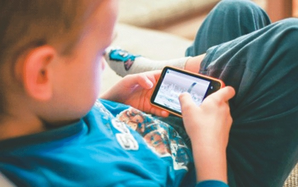New Delhi: Smartphone addiction among children under the age of 10, is known to be detrimental for the eyes. However, doctors on Saturday warned that spending excessive time on the device may worsen physical health and cause a host of behavioural issues.
According to the World Health Organization (WHO) guidelines, children under five must spend less time watching screens. While the UN health body does not recommend screen time for infants and 1-year-old, those aged 2 years should not be exposed for more than an hour.
However, “even toddlers as young as one and a half years old are being handed smartphones by their parents,” Dr Rajiv Uttam, Director, Paediatric Pulmonology, Critical Care Paediatrics (PICU), Paediatric Care, Medanta The Medicity, Gurugram, told IANS.
The doctor noted that illnesses such as “diarrhoea, fever, and other health issues are observed in children who spend excessive time on their devices”.
Several studies have shown the negative impact of smartphone use on the eye. Prolonged use of smartphones in children has been linked with vision impairment, and dry eyes among others.
Dr Vikas Taneja, Consultant Paediatrics, Manipal Hospital, Dwarka explained that this is majorly due to radiation, as the children use their mobile phones at a very close distance.
“Children can present with excessive eye strain, which can lead to redness of the eyes and excessive itching. This can lead to frequent rubbing and watering. The strain in the eyes can lead to headaches, and their sleep might get disturbed. Excessive mobile phone use can also affect the muscles of the eye,” he told IANS.
This sleep loss can, further, lead to a lot of anxiety and depression. Usually, such children tend to be alone, have low self-esteem, become excessively irritable, have a lot of aggression and behavioural changes, and may throw tantrums.
Rajiv said that overuse often leads to a detachment from the real world, and the children are likely to display symptoms akin to virtual autism.
“Habitual smartphone use during meals also contributes to poor eating habits, obesity, and related health issues such as high blood pressure and sugar levels ultimately leading small kids to pre-diabetic stage.”
Importantly, the visual impairments and attention deficits further compound these concerns, often remaining unnoticed until academic performance suffers, the doctor said.
To mitigate these risks, the health experts advised parents to prioritise quality time with their children, encourage healthy eating habits, and limit screen time per day. Furthermore, balancing technology with outdoor activities and nutritious meals is crucial in fostering holistic child development.
–IANS


Comments are closed.